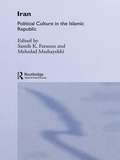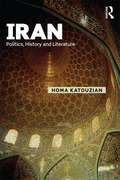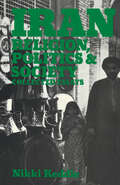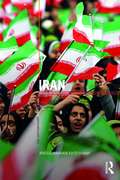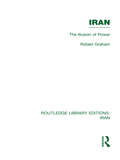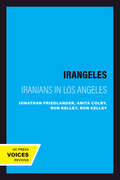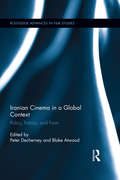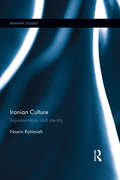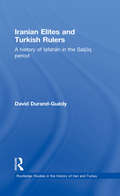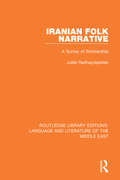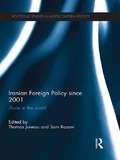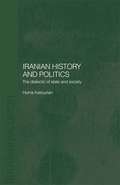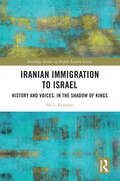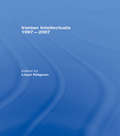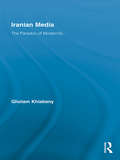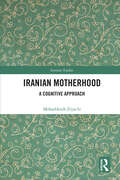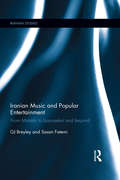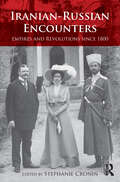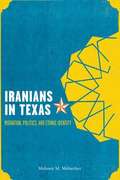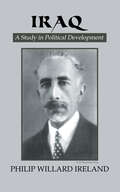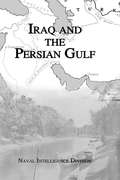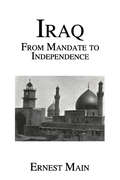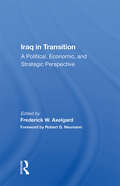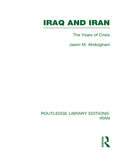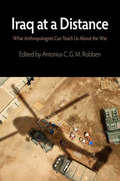- Table View
- List View
Iran: Political Culture in the Islamic Republic
by Samih K. Farsoun Mehrdad MashayekhiSince the Islamic revolutionary movement overthrew the "Peacock Throne" (the Shah) in 1979 the Islamic Republic has maintained its credibility and the loyalty of the people of Iran. It has survived an extremely destructive war with Iraq, isolation from the West and the rest of the Middle East except Syria, and the death of the Ayaltollah Khomeini. This book explores the social transformation of Iran in this period stressing the importance of political culture and ideology. It argues that the systematic building of a legitimate Islamic political culture is the key to the success of the regime. The authors of the book address specific aspects of Iran's political culture within a general theoretical framework laid out in the introduction. There is discussion of a wide range of topics ranging from the relationship of the individual to society to "Westoxication", from Shi'ism to the Islamisation of film culture.
Iran: Politics, History and Literature (Iranian Studies)
by Homa KatouzianThis book offers a view of Iran through politics, history and literature, showing how the three angles combine. Iran, being a revolutionary society, experienced two great revolutions within the short span of just seventy years, from the 1900s to the 1970s. Both were massive revolts of the society against the state; the main objective of the first being to establish lawful government to make modernisation possible, and the second, to overthrow the absolute and arbitrary state, though this time mainly under the banner of religion and Marxism-Leninism and anti-Westernism. Neither of them succeeded in their lofty ideals for reasons that are explained and analysed within. The author also offers a detailed description of Iran’s short-term society, examining the political and intellectual lives of two of the most remarkable intellectuals-cum-politicians of the twentieth century. This book provides an overview of modern Persian literature, both poetry and prose, and discusses the works of three of the most remarkable Persian poets and writers of the period. It considers classical Persian literature through the great variety of its form and substance, and neo-classical literary developments in the nineteenth century, covering the whole history of Persian literature. This is crowned in the last chapter by the love poetry of one of the greatest Persian poets. Iran will be of interest to students and scholars of Iranian studies and Middle East Politics.
Iran: Religion, Politics and Society: Collected Essays
by Nikki R. KeddieFirst Published in 1983. Routledge is an imprint of Taylor & Francis, an informa company.
Iran: Stuck in Transition (The Contemporary Middle East)
by Anoushiravan EhteshamiHaving been ruled, more or less continuously, by a range of monarchical dynasties for three millennia, the end of the monarchy in Iran was relatively sudden, taking place in two short years. Since then, Iran has gone through tumultuous change, yet is still apparently caught in a cycle of transition. Iran has now created a complex but unique and non-transferrable system of government, but the question to be asked is whether the Islamic republic has lived up to its founding expectations, serving the Iranian people and helping them to realize their aspirations. This book is the first comprehensive analytical study of the forces which have been shaping and changing modern Iran and its relations with the rest of the world. It looks at the roots of the 1979 revolution and the forces unleashed during the modernization process under the Pahlavi monarchy. Applying a range of theoretical approaches to understanding the Islamic republic’s neo-authoritarian political system, Anoushiravan Ehteshami reflects on how the country’s new elite emerged and how these new political forces have changed Iran, the stresses on its political system, the forces shaping the country’s political economy, and the Islamic republic’s international relations. As some of Iran's leaders appear to crave permanent revolution as their means of staying in power, this book argues that the struggle for the soul of the Islamic Republic has mired the country in a cycle of change: Constant reform and transition. The republic finds itself stuck in transition. Written in a clear and insightful manner, this book provides an unparalleled analysis of the Islamic Republic of Iran as a major regional actor and gives fresh insights into the political workings of the world’s only Shia, and revolutionary, Islamic republic. It will be of great importance to students and scholars of Middle East Politics and International Relations, as well as the policy community whose gaze is never too far from this unique country.
Iran: The Illusion of Power (Routledge Library Editions: Iran)
by Robert GrahamThe sudden increase of oil prices in 1973 meant that the foreign revenues of Iran quadrupled in just over two months. As the first OPEC member to begin disbursing this extra revenue on a significant scale, Iran offers the first complete example of the social, economic and political problems this caused. This book examines the cycle of the boom and the years that led up to it – from the rural and essentially backward nature of the country to the euphoria of 1973 when the Shah seriously talked of Iran reaching the Great Civilisation, where by the 1990s Iran would be the world’s fifth power. And then finally through to the loss of control over expenditure, the cancellation of ambitious projects and eventual disillusionment with all the attendant problems of expectations and increased social and political tension. A comprehensive analysis of the system of government in Iran is provided in Part Three of the book, demonstrating that this has created a repressed stability, incapable of promoting social and economic progress.
Irangeles: Iranians in Los Angeles
by Jonathan Friedlander Ron Kelley Anita ColbyThis title is part of UC Press's Voices Revived program, which commemorates University of California Press’s mission to seek out and cultivate the brightest minds and give them voice, reach, and impact. Drawing on a backlist dating to 1893, Voices Revived makes high-quality, peer-reviewed scholarship accessible once again using print-on-demand technology. This title was originally published in 1993.This title is part of UC Press's Voices Revived program, which commemorates University of California Press’s mission to seek out and cultivate the brightest minds and give them voice, reach, and impact. Drawing on a backlist dating to 1893, Voices Revived</DIV
Iranian Cinema in a Global Context: Policy, Politics, and Form (Routledge Advances in Film Studies)
by Peter Decherney Blake AtwoodIranian films have been the subject of much critical and scholarly attention over the past several decades, and Iranian filmmakers are mainstays of international film festivals. Yet most of the attention has been focused on a small segment of Iranian film production: auteurist art cinema. Iranian Cinema in a Global Context, on the other hand, takes account of the wide range of Iranian cinema, from popular youth films to low budget underground films. The volume also reassesses the global circulation of Iranian art cinema, looking at its reception at international festivals, in university curricula, and at the Academy Awards. A final theme of the volume explores the intersection between politics and film, with essays on post-Khatami reform influences, representations of ineffective drug policies, and the representation of Jewish characters in Iranian film. Taken together, the essays in this volume present a new definition of the field of Iranian film studies, one that engages global media flows, transmedia interaction, and a heterogeneous Iranian national cinema.
Iranian Culture: Representation and Identity (Iranian Studies)
by Nasrin RahimiehThroughout modern Iranian history, culture has served as a means of imposing unity and cohesion onto society. The Pahlavi monarchs used it to project an image of Iran as an ancient civilisation, re-emerging as an equal to Western nations, while the revolutionaries deployed it to remake the country into an Islamic nation. Just as Iranian culture has been continually re-interpreted, the representations and avocations of Iranian identity vary amongst Iranians across the world. Iranian Culture: Representation and Identity demonstrates these fissures and the incompatibilities that refuse to be written out of national culture, analysing works of literature, popular music, graphic art and film, as well as oral narratives. Using works produced before and after the 1979 revolution, created both inside and outside of Iran, this study reveals neglected complexities and contradictions in the field of Iranian cultural production. It considers how contested claims to culture, whether they originated in Iran or the Iranian diaspora, shape our understanding of this culture and what spaces they create for new articulations of it, and in doing so offers an important re-examination of our collective concept of culture. This book would be an excellent resource for students and scholars of Middle East Studies and Iranian Studies, specifically Iranian culture including film and contemporary literature and the Iranian diaspora.
Iranian Elites and Turkish Rulers: A History of Isfahan in the Saljuq Period (Routledge Studies in the History of Iran and Turkey)
by David Durand-GuedyThe Saljuq period of the eleventh and twelfth centuries saw the arrival in Iran of Türkmen nomads from Central Asia and the beginning of Turkish rule. Through the example of the city of Isfahan, the book analyses the internal evolution of Iranian society in this period and the interaction of the Iranian elites and Turkish rulers. Drawing on an analysis of a wide range of sources, including poetic and epistolary material, this study fills an historiographical gap and casts new light on the two centuries prior to the Mongol invasion. This comprehensive analytical study provides a new contribution to the understanding of many crucial issues: the cultural divide between Western and Eastern Iran; the military potential of city-dwellers; the attitude of the Turkish rulers toward cities and city life; the action of the famous vizier Nizam al-Mulk; the meaning of the Ismaili uprising; and above all the structure of the local elite, organized into rival networks and largely autonomous vis-à-vis state powers. The study is enhanced by a variety of additional features, including extensive genealogical tables, Arabic script and maps. Providing a new understanding of the cultural identity of Iran, this book is an important contribution to the study of the history of Iran and the Medieval period.
Iranian Folk Narrative: A Survey of Scholarship (Routledge Library Editions: Language & Literature of the Middle East #1)
by Juliet RadhayrapetianFor centuries Iran hosted numerous travellers and visitors of diverse nationalities and backgrounds. Many of these travellers left behind documents in which they recorded their observations during their residence in Iran, and these embody a vast range of firsthand information about the land and its people at different periods of time. This book, first published in 1990, takes as its subjects the nature and history of Iranian folk narrative scholarship. The contributions of travellers are given their due recognition as important source documents.
Iranian Foreign Policy Since 2001: Alone in the World (Routledge Studies in Middle Eastern Politics)
by Thomas Juneau Sam RazaviExamining Iranian foreign policy, with a focus on the years since 2001, this book analyses the defining feature of Iran’s international and regional posture, its strategic loneliness, and the implications of this for the Islamic Republic’s foreign policy. Iranian Foreign Policy since 2001 offers an in-depth analysis of the key drivers behind Iran’s foreign policy; power, strategic culture, and ideology. In addition, the authors examine Iran’s relations with key countries and regions, including its often tenuous relations with China, Russia and America, as well as its bilateral relations with non-state actors such as Hezbollah. The common thread running throughout the volume is that Iran is alone in the world: regardless of its political manoeuvrings, the Islamic Republic’s regional and international posture is largely one of strategic loneliness. Assimilating contributions from the US, Canada, Europe and Iran, this book provides an international perspective, both at the theoretical and practical levels and is essential reading for those with an interest in Middle Eastern Politics, International Relations and Political Science more broadly.
Iranian History and Politics: The Dialectic of State and Society (Routledge/BIPS Persian Studies Series)
by Homa KatouzianThis book contains the most detailed and comprehensive statement of Homa Katouzian's theory of arbitrary state and society in Iran, and its applications to Iranian history and politics, both modern and traditional. Every chapter is a study of its own specific topics while being firmly a part of the whole argument. The discussions include close comparisons with the history of Europe to demonstrate the diversities of the logic and sociology of Iranian history from their European counterparts. Being the first modern theory of Iranian history, it is highly regarded by Iranian historians and social scientists, especially as it has helped to resolve many of the anomalies resulting from the application of traditional theories.
Iranian Immigration to Israel: History and Voices, in the Shadow of Kings (Routledge Studies in Middle Eastern Society)
by Ali L. EzzatyarExploring the fascinating history behind Iranian-Jewish immigration to Israel, this book offers a rare and untold history of one of Israel’s Middle Eastern Jewish populations. Over the twentieth century, thousands among Iran’s Jewish community left their ancestral homes and immigrated to the Jewish State, while thousands remained in Iran, even after the birth of the Islamic Republic of Iran. Using first-hand narratives, the evolution of Zionist activities and recruitment in Iran over the last century is covered, alongside an Iranian-Jewish population that, unlike other Middle Eastern Jewish communities, did not ultimately arrive in the Holy Land as a majority of their community. For those that did arrive (or, make aliyah) the Israeli nation-building process had unique ramifications. The integrative process and current status of the Iranian community in Israel is also examined, providing an intimate picture of Iranian life in Israel, nearly 75 years after Israel’s establishment. A natural addition to any collection on Jewish or Israeli history, and essential reading for a full understanding of Iran-Israel relations, students of Israeli nation-building and affairs, as well as Iranian history, demographics, and politics will find this book invaluable.
Iranian Intellectuals: 1997–2007
by Lloyd RidgeonPreviously published as a special issue of British Journal of Middle East Studies, this volume focuses on leading figures within Iran between 1997-2007 and their visions and works that are related to Iranian society. A cross section of opinion is investigated, including the clerical (‘Ali Khameneh’i, Muhammad Khatami and Mohsen Kadivar), the dissident (Mohsen Makhmalbaf), and the poetic (Qaysar Aminpour) and cinematic. The past decade has been a traumatic one in Iran, and the essays in this volume testify to the vibrancy of the responses from Iranian thinkers. It may be a surprise to some observers that in some senses, ‘Ali Khameneh’i may be considered a ‘liberal’ whereas Muhammad Khatami’s own credentials as an advocate of rapprochement with the West needs to be qualified. Responses to Western culture continue to remain centre-stage, and this is also nowhere more apparent than in the complex relationship between the directors of Iranian films (perhaps Iran’s most celebrated export these days) and their audiences, both Iranian and Western. Despite some viewing Iran as a pariah state, it remains firmly connected to the West and to modern technology, typified in the practice of blogging that is enjoyed by so many Iranians, which has provided a new space for expression and thinking.
Iranian Media: The Paradox of Modernity (Routledge Advances in Internationalizing Media Studies)
by Gholam KhiabanyThe post-revolutionary state in Iran has tried to amalgamate ‘Sharia with electricity’ and modernity with what it considers as ‘Islam’. While sympathetic to private capital, through quasi anti-capitalist politics, the state began to restrict market-relations, confiscate major assets of sections of the Iranian bourgeoisie, and nationalize major aspects of Iran’s industry, including its communications system. Since the end of war with Iraq and the start of the process of ‘reconstruction’, market-driven development and economic policies have been key aims of the state.
Iranian Motherhood: A Cognitive Approach (Iranian Studies)
by Mohaddeseh ZiyachiThis book characterises the problematic status of motherhood in present-day Iranian society – that is, problem in the Foucauldian sense of an object of thought and a source of tension, not as a pathological issue – and explains the historical processes contributing to this problematisation. Taking an interdisciplinary approach, the author draws on a cognitive anthropological perspective whilst incorporating ethnographic, historical, and evolutionary viewpoints. By applying this perspective to the current cultural model of motherhood, and considering specific social, political, and economic factors in Iran, the author provides an exhaustive, contextualised understanding of the motherhood problem and its multidirectional changes throughout time. The book follows a multi-method framework and combines qualitative ethnographic and auto-ethnographic data with historical evidence and comparative data. As such, it also contributes to the women's movement in Iran by fostering discussion on women's issues and demystifying women's understandings and experiences. The book will appeal to those working in a range of disciplines, including gender studies, cognitive anthropology and Iranian history. Written in non-technical language, and providing insights into the problem of motherhood in comparable contexts, the book will also be of interest to general readers.
Iranian Music and Popular Entertainment: From Motrebi to Losanjelesi and Beyond (Iranian Studies)
by Sasan Fatemi Gj BreyleyThe word motreb finds its roots in the Arabic verb taraba, meaning 'to make happy.' Originally denoting all musicians in Iran, motrebi came to be associated, pejoratively, with the cheerful vulgarity of the lowbrow entertainer. In Iranian Music and Popular Entertainment, GJ Breyley and Sasan Fatemi examine the historically overlooked motrebi milieu, with its marginalized characters, from luti to gardan koloft and mashti, as well as the tenacity of motreb who continued their careers against all odds. They then turn to losanjelesi, the most pervasive form of Iranian popular music that developed as motrebi declined, and related musical forms in Iran and its diasporic popular cultural centre, Los Angeles. For the first time in English, the book makes available musical transcriptions, analysis and lyrics that illustrate the complexities of this history. As it presents the findings of the authors' years of ethnographic work with the history's protagonists, from senior motreb to pop-rock stars, the book reveals parallels between the decline of motrebi and the rise of 'modernity.' In the twentieth century, the fate of Tehran's motrebi music was shaped by the social and urban polarization that ensued from the modern market economy, and losanjelesi would be similarly affected by transnational relations, revolution, war and migration. Through its detailed and informed examination of Iranian popular music, this study reveals much about the values and anxieties of Iranian society, and is a valuable resource for students and scholars of Iranian society and history.
Iranian-Russian Encounters: Empires and Revolutions since 1800 (Iranian Studies)
by Stephanie CroninOver the past two hundred years, encounters between Iran and Russia have been both rich and complex. This book explores the myriad dimensions of the Iranian-Russian encounter during a dramatic period which saw both Iran and Russia subject to revolutionary upheavals and transformed from multinational dynastic empires typical of the nineteenth century to modernizing, authoritarian states typical of the twentieth. The collection provides a fresh perspective on traditional preoccupations of international relations: wars and diplomacy, the hostility of opposing nationalisms, the Russian imperial menace in the nineteenth century and the Soviet threat in the twentieth. Going beyond the traditional, this book examines subaltern as well as elite relations and combines a cultural, social and intellectual dimension with the political and diplomatic. In doing so the book seeks to construct a new discourse which contests the notion of an implacable enmity between Iran and Russia Bringing together leading scholars in the field, this book demonstrates extensive use of family archives, Iranian, Russian and Caucasian travelogues and memoirs, and newly available archives in both Iran and the countries of the former Soviet Union. Providing essential background to current international tensions, this book will be of particular use to students and scholars with an interest in the Middle East and Russia.
Iranians in Texas: Migration, Politics, and Ethnic Identity
by Mobasher Mohsen M.Thousands of Iranians fled their homeland when the 1978–1979 revolution ended the fifty-year reign of the Pahlavi Dynasty. Some fled to Europe and Canada, while others settled in the United States, where anti-Iranian sentiment flared as the hostage crisis unfolded. For those who chose America, Texas became the fourth-largest settlement area, ultimately proving to be a place of paradox for any Middle Easterner in exile. Iranians in Texas culls data, interviews, and participant observations in Iranian communities in Houston, Dallas, and Austin to reveal the difficult, private world of cultural pride, religious experience, marginality, culture clashes, and other aspects of the lives of these immigrants. Examining the political nature of immigration and how the originating and receiving countries shape the prospects of integration, Mohsen Mobasher incorporates his own experience as a Texas scholar born in Iran. Tracing current anti-Muslim sentiment to the Iranian hostage crisis, two decades before 9/11, he observes a radically negative shift in American public opinion that forced thousands of Iranians in the United States to suddenly be subjected to stigmatization and viewed as enemies. The book also sheds light on the transformation of the Iranian family in exile and some of the major challenges that second-generation Iranians face in their interactions with their parents. Bringing to life a unique population in the context of global politics, Iranians in Texas overturns stereotypes while echoing diverse voices.
Iraq
by IrelandFirst published in 2005. Routledge is an imprint of Taylor & Francis, an informa company.
Iraq & The Persian Gulf
by Naval Intelligence DivisionFirst Published in 2005. Routledge is an imprint of Taylor & Francis, an informa company.
Iraq From Manadate Independence
by Ernest MainFirst published in 2008. Routledge is an imprint of Taylor & Francis, an informa company.
Iraq In Transition: A Political, Economic, And Strategic Perspective
by Frederick W AxelgardAfter twenty-five years of thinly veiled hostility, U.S. relations with post-monarchial Iraq have warmed dramatically. Simultaneously, Iraq's sovereignty has become the keystone of Gulf stability, due to Iraq's military and economic resilience and to the rise of Khomeini's Iran and the waning of Saudi influence. In this book, five leading analysts
Iraq and Iran: The Years Of Crisis (Routledge Library Editions: Iran)
by Jasim M AbdulghaniBehind the Iran-Iraq war rests a history of conflict stretching back to the Ottoman Turks and the Persians. This book examines the deep-seated and complex factors involved in the rivalry between these two nations. It focuses particularly on the period between 1969 and 1984, a time that saw both the rise of the Ba’th party in Iraq and Khomeini’s return to power in Iran. These changes did much to escalate tensions. The Ba’th party’s ideological, socialist regime and its emphasis on political secular concerns stood in marked contrast to Iran under Khomeini and his efforts to spread an Islamic revolution among the nation’s Shiite majority. The author discusses how these differences have affected three long-term problems: Iraq’s and Iran’s rivalry for dominance in the Arabian Gulf region; disputes over the Shatt al-Arab waterway, which serves as a boundary between the two nations; and the Kurdish rebellion in Iraq, supported by Iran. The volume also looks at the most recent episodes of crisis and analyzes the evolution of the Iran-Iraq war and its implications both regionally and globally. Unlike other studies of Iraq’s relations with Iran, Abdulghani’s is distinguished by its systematic and comprehensive synthesis which interlocks legal, cultural, historical and political issues that have characterized relations between the two countries.
Iraq at a Distance
by Antonius C. G. M. RobbenThe Iraq War has cost innumerable lives, caused vast material destruction, and inflicted suffering on millions of people. Iraq at a Distance: What Anthropology Can Teach Us About the War focuses on the plight of the Iraqi people, caught since 2003 in the carnage between U.S. and British troops on one side and, on the other, Iraqi insurgents, militias, and foreign al Qaeda operatives.The volume is a bold attempt by six distinguished anthropologists to study a war zone too dangerous for fieldwork. They break new ground by using their ethnographic imagination as a research tool to analyze the Iraq War through insightful comparisons with previous and current armed conflicts in Cambodia, Israel, Palestine, Northern Ireland, Afghanistan, and Argentina. This innovative approach extends the book's relevance beyond a critical understanding of the devastating war in Iraq. More and more parts of the world of long-standing ethnographic interest are becoming off-limits to researchers because of the war on terror. This book serves as a model for the study of other inaccessible regions, and it shows that the impossibility of conducting ethnographic fieldwork does not condemn anthropologists to silence.Essays analyze the good-versus-evil framework of the war on terror, the deterioration of women's rights in Iraq under fundamentalist coercion, the ethnic-religious partitioning of Baghdad through the building of security walls, the excessive use of force against Iraqi civilians by U.S. counterinsurgency units, and the loss of popular support for U.S. and British forces in Iraq and Afghanistan after the brutal regimes of the Taliban and Saddam Hussein had been toppled.
